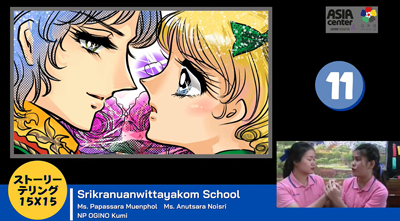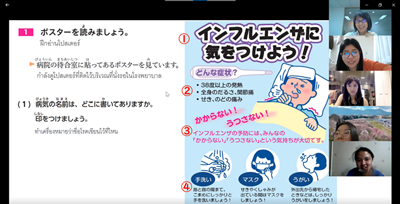Initiatives of The Japan Foundation, Bangkok Amid the COVID-19 Pandemic
The Japan Foundation, Bangkok
IIO Koji, OTA Yoshie, KOJIMA Keiko, NISHIJIMA Ayako
On March 26, 2020 a state of emergency was declared across the whole of Thailand in a bid to halt the spread of COVID-19. Accompanying that, the start of the new term was changed from May to July at secondary educational institutions, and online classes continued based on the judgement of each school after a ban on in-person classes was conditionally lifted in July even at higher secondary educational institutions. In this way, even at the front-lines of Thailand’s Japanese-language education, fiscal 2020 has been a tumultuous year in which changes have been faced. However, the Japanese-Language Specialists at The Japan Foundation, Bangkok (hereinafter the “JFBKK”) have remained in Thailand and continued to support Japanese-language education. We will go over three of our initiatives below.
1. JFBKK Hosted an Online Japanese-Language Education Seminar
Once a year, we had been inviting teachers from overseas and holding the “Japanese Language Education Seminar for University” in person, but in fiscal 2020, we postponed it because it became difficult to hold in-person seminars. Accordingly, in February 2021, we held the seminar online.
As a theme for the seminar, we chose “Active learning in an online environment,” a topic that teachers are very interested in. It was held in two parts, with the first part featuring a keynote speech from Associate Professor (at that time) Tomohisa Yamada of Hokkaido University, who has also written books on active learning. Professor Yamada’s speech was very easy to understand and full of things worth learning. The second part of the seminar was a practical report from three Japanese-language teachers, and was deeply impressive because it did not stop at simply sharing a range of ideas – it conveyed the struggles and joys of the classroom as well.
Thanks to the presenters at this seminar sharing their ideas and their struggles, I think the event successfully encouraged the participants to feel like wanting to take a step forward also. We appreciate that this outcome is due not only to the efforts of Professor Yamada and the three individuals who presented the report, but to all the stakeholders, including our colleagues who work alongside us at the JFBKK.
2. Japanese-Language Contest Held Online for Students at Schools Where NP Were Scheduled to be Dispatched!
The Japan Foundation (hereinafter the “JF”) had been sending Japanese teaching assistants known as “NIHONGO Partners” (hereinafter “NP”) to mainly middle and high schools in Asia from 2014, but the dispatching of NP was halted in fiscal 2020. In the absence of these NP, the JFBKK held an online Japanese-language contest for the students of the schools that had been scheduled to be visited by them, as one part of its support for those schools. The contest was held in December 2020 and was called Story Telling 15 x 15. It combined elements of storytelling and presenting and was an original contest that was newly-created by the JFBKK to suit upper secondary school students in Thailand. 30 students from 15 schools performed, and 15 former NP who had been dispatched to Thailand in the past also provided support from Japan by coaching the students online.
Accompanying the COVID-19 pandemic, Japanese-language contests have been cancelled or postponed across the board in Thailand, and various activities are limited. Amid that, we were able to provide students with an opportunity to present the outcomes of their Japanese-language learning, and to broaden the possibilities of online Japanese-language contests. I believe this was possible for the very reason that all the staff are passionate about “wanting to provide as much support as possible even in difficult circumstances,” as well as the tremendous cooperation of the former NP and the Japanese-language teachers at the schools that NP had been scheduled to visit.
▼Details can be found here:
Nihongokyoiku Tsushin (Japanese Language News) Japanese-Language Education Report No. 44 Online Japanese-Language Contest Story Telling 15 x 15.
Winners of the Online Japanese-Language Contest
3. “Irodori course” (Online) Held for Individuals Wanting to Work and Live in Japan
“Irodori: Japanese for Life in Japan,” a free teaching material aimed at equipping foreigners with the basic Japanese-language communication skills they will need when working and living in Japan, was published online by the JF at the end of March 2020. The JFBKK held the “Irodori Japanese course” online in October 2020. It was a course for studying “Irodori Elementary 1” and comprised 44 sessions in total (two 90-minute sessions per week). A total of 14 individuals studied the course, including upper secondary school students dreaming of studying in Japan, working adults keen to work in Japan, and university graduate students already studying there.
With “Irodori,” participants learn Japanese language for specific Japanese lifestyle settings. When the course covered medicine directions in Japanese (before meals, after meals), one of the learners living in Japan noticing that they had been taking medicine incorrectly, and thus realized the importance of studying kanji. In addition, after doing speech shadowing any number of times during class, there were learners who remembered the phrases so strongly they saw them in their dreams. Furthermore, a learner who took the course while temporarily traveling back to Thailand and then returned to Japan at the final stage of the course reported happily that they had “become able to make myself understood in Japanese,” which also gave us a real sense that the course had meaning.
Running the course online presented difficulties, but the fact that it was held online was also the reason why individuals living in regional areas in Thailand and in Japan were able to take the course. We think this helped create a class where the participants could listen to what it is really like to use the Japanese language in day-to-day life, not just from the teachers but from their classmates as well.

The Irodori Japanese online course
In Closing
In-person courses have their own inherent advantages, and they cannot be replicated in online courses in some respects. However, we believe online courses have their own advantages, and the question of what we can do now is one we have been asking ourselves throughout this year. Regardless of what circumstances we face going forward, we intend to respond flexibly without adopting a defensive stance in any way, and tackle the various challenges.
- What We Do Top
- Arts and Cultural Exchange [Culture]
- Japanese-Language Education Overseas [Language]
- Japanese-Language Education Overseas [Language] Top
- Learn Japanese-language
- Teach Japanese-language
- Take Japanese-Language Test
- Know about Japanese-language education abroad
- The Japanese-Language Institute, Urawa
- The Japanese-Language Institute, Kansai
- Japanese-Language Programs for Foreign Specified Skilled Worker Candidates
- Japanese Language Education for Japanese Children Resident Overseas and for the Descendants of Migrants
- Archives
- Japanese Studies and Global Partnerships [Dialogue]
- JF digital collection
- Other Programs / Programs to Commemorate Exchange Year
- Awards and Prizes
- Publications
